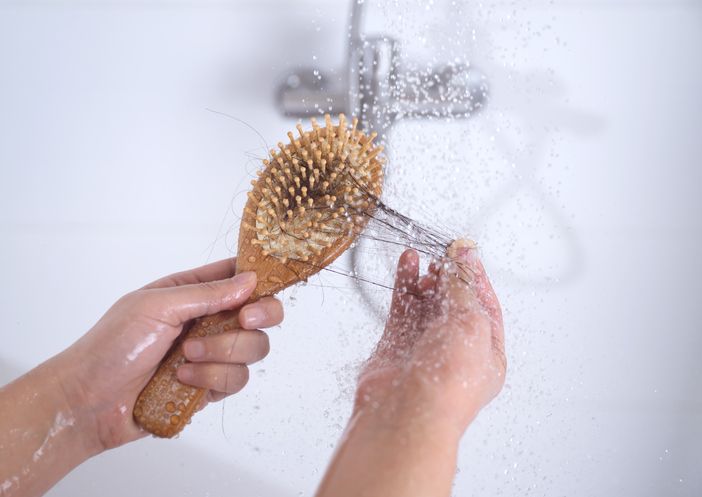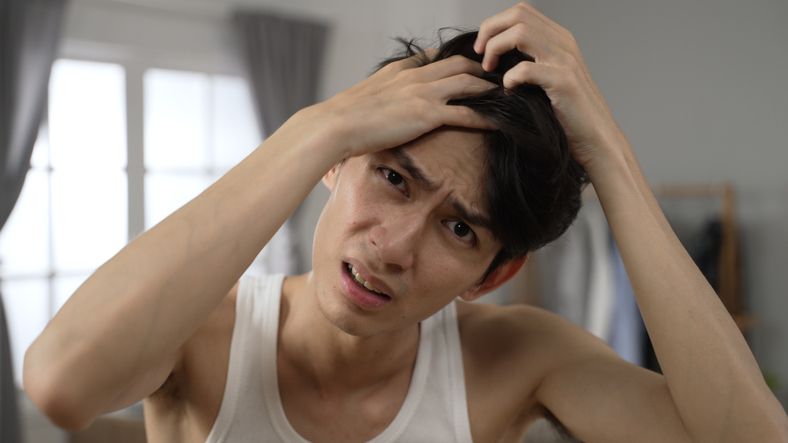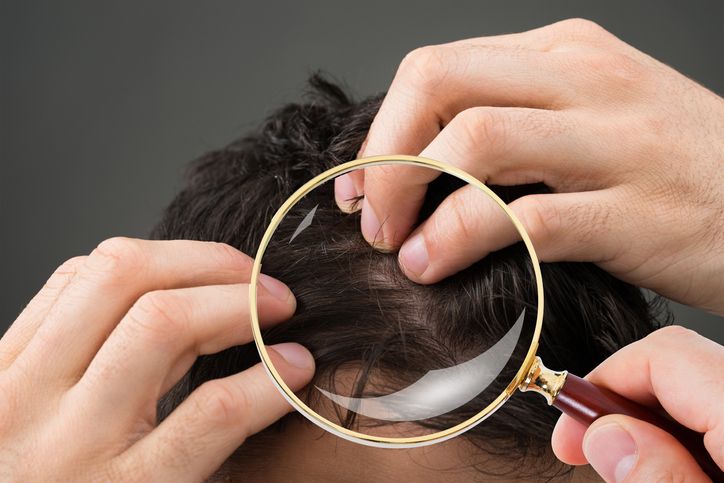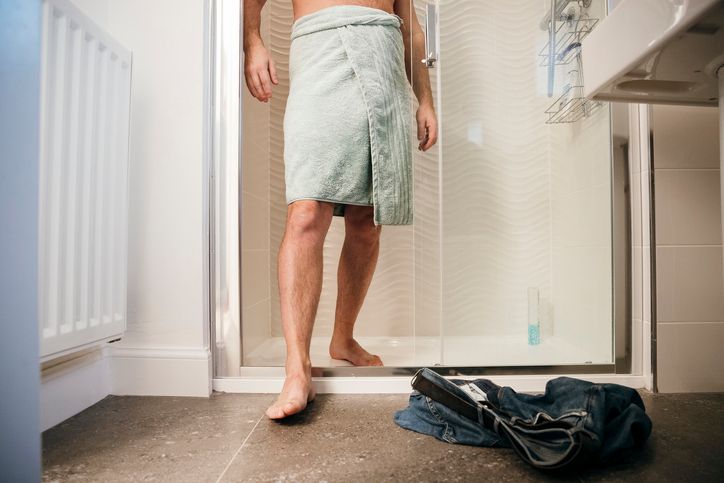

Book Now to Experience
F8 Hair Regrowth Treatment
1 Minute Self-Registration
Date should not be before minimal date
Author: Leila Tan|Updated: 23 July 2024
If you've ever thought how much hair is normal to lose in the shower, you're not the only one. A lot of people worry when they see clumps of hair in their drains or on their hairbrushes. But hair loss is a normal part of the hair cycle and doesn't always mean you have a disease that causes hair loss. Go through the article to check if you belong to which!

1
General Concept of How You Get Excessive Hair Loss

There are actually three stages in the hair cycle: anagen, catagen, and telogen. During the anagen phase, the hair comes out of the follicle. In the catagen phase, the hair stops growing and separates from the blood supply. Telogen is the sleeping phase, when hair falls out and a new one starts to grow. A study conducted in 2018 states that the average person loses about 100 hairs a day, but this number can change based on factors like:
- The length of your hair. Most of the time, thick hair generally has more hair. If you have more hair, you may lose more hair than someone with less hair.
- The last time you took a shower. When you shampoo or condition your hair, you trigger your scalp, which makes your hair fall out. Shampooing gives the hairs that were already going to fall out the push they need, and your hair falls out. If you haven't taken a shower in a few days, you may see more hairs falling out.
- When you last brushed your hair properly. It's kind of like when you take a shower. The most likely times to notice hair loss are when you comb or brush your hair and when you take a shower. The shower is usually where you see the most hair falling out, and this is why we are discussing this issue today.


2
How to Know If My Hair Shedding Rate is Normal?

So, how do you know if the amount of hair you lose is normal or too much? If you worry that you are losing too much hair, you can do an easy test at home to find out how fast your hair falls out. The pull test and the comb test are two ways to find out.
For the pull test, you run your fingers through your clean, dry hair and gently pull about 60 hairs up. Normal hair loss is when about six strands of hair fall out. If more than 15 hairs fall out, it could mean that you are losing too much hair.
The comb test is when you lie down on a bed and comb your hair from the back of the top of your head to the front of the neck. You can catch the hair with a white sheet or a towel. Count how many hair strands fall out when you comb. If there are up to 10 hairs, this is considered normal. If you're losing more than that, you might have a problem.
These tests aren't very accurate, and the results can change based on your hair type, length, and condition. They can give you a rough idea of how much hair you lose on average, but they can't tell you what's causing it.
Read More

3
7 Things That Make You Lose More Hair in the Shower Than Usual

It's normal to lose some hair in the shower, but if you see more hair in your drain or on your comb than usual, you might wonder what's going on. There are many things that could cause hair loss, and some are more dangerous than others. Here are seven common reasons why you might be losing more hair in the shower than usual.
1. Stress.
Stress can change a lot of things about your body, including your hair. When you're always stressed out, your body makes more cortisol, a hormone that can mess up your hair's growth cycle and make you lose more hair. Try doing things to relax, like yoga, deep breathing, or meditation, to lower your stress level.
2. Changes in the hormones.
Hormones are a big part of how your hair grows and how fast it grows. If your hormone levels change, so can your hair. For example, hormonal changes can be caused by pregnancy, menopause, thyroid problems, and birth control pills. These changes can lead to hair loss. If you think your hormones are out of balance, you should see a doctor to find out what's wrong and how to fix it.
3. Nutritional deficits.
For your hair to grow in a healthy and strong way, it needs things like protein, iron, zinc, biotin, and vitamin B12. If you don't get enough of these nutrients from the food you eat, your hair may become weak and brittle, making it more likely to break and fall out. Eat a well-balanced diet with lean meats, eggs, nuts, seeds, beans, leafy veggies, and dairy products to avoid not getting enough of certain nutrients.
4. Infections of the scalp.
Fungal or bacterial infections of the scalp can cause inflammation and irritation on the scalp, which can damage your hair cells and cause you to lose hair. Some common signs of a scalp infection are itching, redness, scaling, flaking, or pus on the head. If you have any of these signs, you should see a doctor to find out what's wrong and how to treat it.
5. Hair care items and tools for style.
Some hair products and tools can be hard on your skin and hair if you use them too often or in the wrong way. For example, shampoos with sulphates can make your hair dry and brittle by stripping it of its natural oils and wetness.
In the same way, hair dryers, curling irons, flat irons, and chemical treatments can damage your hair with heat and chemicals, making it weaker and more likely to break or fall out. Use gentle shampoos and conditioners that are right for your hair type, limit the use of heat styling tools and chemical treatments, and use a heat protectant spray before you style your hair to keep it from getting damaged.
6. Heredity.
One of the main reasons why both men and women lose their hair is because of their genes. If loss or thin hair runs in your family, you may get genes that make you more likely to lose your hair as you get older. Androgenetic alopecia, male-pattern baldness, or female-pattern baldness, based on the way the hair falls out, is a type of hair loss. There is no fix for hair loss that is caused by genes, but there are ways to slow or stop further hair loss.
7. Health problems or medicines.
As a side effect or symptom, hair loss can also be caused by some medical illnesses or medicines. For example, autoimmune diseases like alopecia areata or lupus, illnesses like syphilis or HIV, and cancers like leukaemia.
- Treatments for cancer, like chemotherapy or radiation therapy - Drugs for high blood pressure, like beta-blockers or diuretics - Antidepressants, like fluoxetine or sertraline - Blood-thinning drugs, like warfarin or heparin
If you have any of these problems or take any of these drugs, talk to your doctor about how they might affect your hair and what you can do about them.


4
What Kind of Shampoo Stops Hair from Falling Out?

Although hair loss can be caused by things like genes, hormones, stress, food, or problems with the scalp, getting the right shampoo can help stop or slow hair loss by getting to the bottom of the problem and making the scalp and hair follicles healthier. Here are some tips on how to choose a shampoo that can help stop hair loss:
Pick the right ingredient.
Look for shampoos that have ingredients like ginseng, caffeine, niacin, or biotin that can improve blood flow and nourish the hair. These chemicals can help hair grow faster and make the roots stronger.
Stay away from shampoos with strong ingredients like sulphates, parabens, or alcohol. These chemicals can strip the scalp and hair of their natural oils and moisture, leading to dryness, irritation, and inflammation. These health problems can hurt hair cells and cause hair loss.
Know your hair type and scalp condition.
- Choose shampoos that work well with your hair type and your scalp condition. For example, if you have a sticky scalp and are losing hair, you might want to use a shampoo that can stop your scalp from making too much sebum and clean it without making it too dry. If your scalp is dry and you're losing hair, you might want to use a shampoo that can moisturise and calm the skin without making the hair heavy.
You don't have to wash your hair every day.
Use products that are both gentle and good for your hair. You don't have to wash your hair every day. Doing so can strip your hair of its natural oils and make it more likely to break. You also don't need to use a lot of shampoo, as this can leave behind leftovers that can clog the pores and slow hair growth. When you shampoo, gently rub your head with your fingertips. This can help get the blood flowing and get rid of dirt and dead skin cells.
By using these tips, you can find a shampoo that will help stop hair loss and make your hair healthier and look better. Remember that shampoo is not a magic cure for hair loss. If you are losing a lot of hair or it keeps coming back, you may need to see a doctor or a dermatologist.

Book Now to Experience
F8 Hair Regrowth Treatment
1 Minute Self-Registration
Date should not be before minimal date

5
Habits You Should Practise to Reduce Hair Shedding in Shower

If you're worried about your hair loss, you should talk to a doctor or a specialist to find out what's causing it and how to treat it best. There are many ways to treat hair loss, such as with pills, lotions, vitamins, or even surgery. You can also try making changes to your habits to stop hair loss, such as:
* Use a wide-toothed comb to gently get rid of knots in your hair. Don't use a bristle brush or a small-toothed comb, which can pull out more hair and break it.
* Don't use blow dryers, curling irons, or flat irons to style your hair. Heat can hurt your hair and make it more likely to break off.
* Wear a hat or use a sunscreen spray for your hair to protect your hair from the sun.
* Get enough protein, iron, zinc, and biotin in your food to help your hair grow.
* Consider getting hair regrowth treatment such as low-level laser treatment to stop excessive hair shedding and reduce hair breakage.


6
Conclusion

In conclusion, it's not unusual to lose a few hairs while you are in shower. The average person loses between 50 and 100 hairs per day, and this number can rise to between 150 and 200 on days when they wash their hair, according to studies. A medical evaluation may be necessary if you find that you are losing more than this amount of hair, or if your hair is thinning or falling out in areas.
Hair loss can have several causes, including stress, hormonal shifts, thyroid issues, dietary inadequacies, and hereditary predisposition. Depending on the root of the problem and its severity, hair loss can be treated in a number of ways. Medication, topical treatments, vitamins, hair transplants, and low-level laser therapy are all examples. Carefully managing your stress levels, eating a healthy diet, and giving your hair the care it deserves to say farewell to thinning hair!
FAQ
1.What disease has the symptom of losing too much hair?
Telogen effluvium is another name for excessive hair loss, which is when you lose more than 100 hairs per day. This can happen when a lot of hair cells go into the resting phase (telogen) of the hair growth cycle, which lasts about 3 months. During this time, the hair falls out easily because it is no longer attached to the scalp.
2.How can I tell if I'm losing a lot of hair or just shedding a lot?
Hair loss and hair falling are two different things that can happen to the hair growth cycle. During the resting part of the hair growth cycle, when you shed hair, you lose more hair than usual. Damage to the hair cells can cause hair loss when hair stops growing or thins out. Hair loss can be caused by genes (like male or female pattern baldness), autoimmune diseases (like alopecia areata), or scarring conditions (like lichen planopilaris).
3.When should I see a doctor if I lose a lot of hair?
If your hair loss lasts longer than 6 months, affects your quality of life, or is followed by other symptoms like itching, redness, pain, or bald patches on your scalp, you should see a dermatologist to get a diagnosis and treatment. Your doctor may do some tests to rule out any diseases or infections that could be causing you to lose a lot of hair. Depending on what's causing your condition and how bad it is, your doctor may give you medicine (like minoxidil, finasteride, or corticosteroids) or suggest a treatment (like platelet-rich plasma therapy or hair transplantation) to help your hair grow back.
4.Can losing weight cause hair to fall out?
Sometimes, losing weight can cause hair loss. This is because losing weight too quickly or too much can put stress on the body, which changes the way hair grows. Weight loss can also leave you without enough iron or protein, which can make your hair weaker and more likely to break.
5.How can I stop losing my hair because I'm losing weight?
The good news is that most hair loss caused by losing weight is brief and can be fixed. The best way to stop hair loss is to find out why you're losing weight and eat a healthy, balanced diet again. You may also find it helpful to take supplements like biotin, zinc, or vitamin B12 that help hair grow. You can also use gentle hair care products and avoid hard treatments or styles that can do more damage to the hair.

Book Now to Experience
F8 Hair Regrowth Treatment
1 Minute Self-Registration
Date should not be before minimal date
Recommended Articles
COPYRIGHT© NEW BEAUTY MANAGEMENT LIMITED 2025. ALL RIGHT RESERVED.




